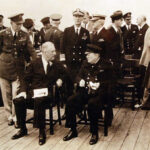
Tom Spahr is back in the studio with another insightful discussion focused on data management, refinement, and exploitation within the military. He is joined by CW4 Kelsey Gibson, a senior technical advisor with years of experience in data and digital modernization in the special operations community. Together, they examine the challenges of developing data literacy across all leadership levels. They also discuss the importance of effectively sorting and filtering large data sets, as well as building the trust necessary to leverage AI and automation for faster decision-making. This conversation offers valuable insights into a crucial topic—tune in to hear their perspectives and share your thoughts!
Tom’s podcast episode with Alex Miller can be found here
AI literacy doesn’t exist without data literacy.
Podcast: Download
Subscribe: Apple Podcasts | Spotify | Amazon Music | Android | Pandora | iHeartRadio | Blubrry | Podchaser | Podcast Index | TuneIn | Deezer | Youtube Music | RSS | Subscribe to A Better Peace: The War Room Podcast
Kelsey Gibson is a Chief Warrant Officer 4 in the U.S. Army and a Senior Technical Advisor with the Special Operations Community, where she has been working data and digital modernization efforts for several years. Kelsey enlisted in the Army as a 96B, Intelligence Analyst in 2003 and commissioned as a 350F, All Source Intelligence Warrant Officer in 2009.
Thomas W. Spahr is the DeSerio Chair of Theater and Strategic Intelligence at the U.S. Army War College. He is a retired colonel in the U.S. Army and holds a Ph.D. in History from The Ohio State University. He teaches courses at the Army War College on Military Campaigning and Intelligence.
The views expressed in this presentation are those of the speakers and do not necessarily reflect those of the U.S. Army War College, U.S. Army, or Department of Defense.
Photo Credit: Image by freepik





Hello. Interesting podcast on data and AI. I have a Ph.D. In AI. I am always astounded that “speakers” never know that the underlying “theory” for AI is called Probably Approximately Correct Learning Theory. This title alludes to the potential for error in the result. Everyone acts like AI will give us correct results. FYI I just retired as the Chief Strategy Officer of NGA.
Dr. Norris,
I like the intel analyst, CIO/G6, and operator lenses on data literacy and AI. I think the Data Scientist (Engineer, Architect, etc.) should also come to light.
Would be interested to pick your brain on AI. I’m exploring concepts for teaching Data Literacy (and AI) for Army Senior Leaders. I was just looking at NGA’s Data Visualization briefing packet from 2017 and I thought it was well done, FWIW.
Vr,
Chad Jagmin